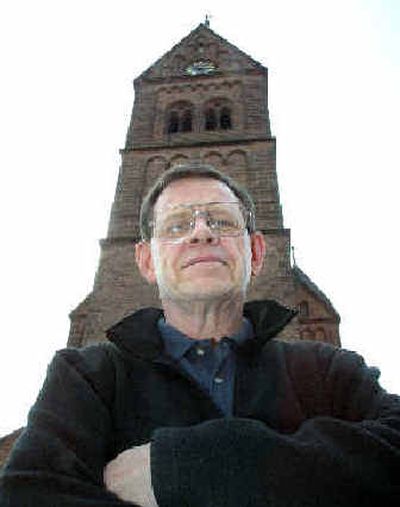Priest who exposed church cover-up to speak at GU

Long before sex abuse became a crisis in the Catholic Church, a Dominican priest working for the Vatican sounded the alarm.
Twenty years ago, the Rev. Thomas P. Doyle submitted a 93-page report to the bishops of the United States detailing the severity of the problem of pedophile priests.
As the canon lawyer for Archbishop Pio Laghi, the Vatican’s ambassador to the United States, Doyle was assigned to look into the crimes of Gilbert Gauthe, a priest in Lafayette, La., who admitted sexually molesting 37 young boys. Many in the church were horrified by Doyle’s findings, which showed that Gauthe wasn’t the only abusive priest. His report also exposed a cover-up – how church officials had known about Gauthe’s behavior but never told parishioners as they moved him from parish to parish.
Nothing was done about the investigation, according to news reports. Doyle, who was once a rising star among the church hierarchy, lost his job. He ended up becoming a chaplain for the Air Force and has appeared as an expert witness in abuse cases.
When the scandal exploded in 2002, Doyle and his 17-year-old report were catapulted into the spotlight.
“The major problem isn’t the sexually abusive priests, but the way the hierarchy has dealt with the crisis,” Doyle said during a phone interview from the Minneapolis area, where he was being deposed for a court case. “It’s not the sex itself, but the cover-up.”
Doyle – who now spends the bulk of his time doing hospice work, ministering to victims and lecturing on the church – will be at Gonzaga University Thursday to talk about the ongoing scandal. His presentation, which is free and open to the public, is part of a series called “Catholicism for a New Millennium,” co-sponsored by Gonzaga’s religious studies department and the honors program.
Coming to grips with the abusive behavior of priests wasn’t easy for Doyle when he first started investigating the problem 20 years ago. But what shocked him even more was the way victims were treated by the church. Instead of helping those who had been damaged by sexual abuse, those in power were more concerned about their reputations and controlling the news, he said.
“Some of the bishops and archbishops were acting dishonestly, and their primary concern was self-preservation,” he said. “The most disappointing thing about the church, of which I remain a member, is the shameful lack of caring and compassionate response to the victims.”
Although he has received support from some priests and the leaders of his religious order, Doyle has been ostracized by many from the church’s hierarchy, according to news reports. In the fall of 2003, his archbishop fired him, ending his 18-year career as an Air Force chaplain.
Archbishop Edwin O’Brien, head of the Archdiocese for the Military Services, withdrew the church’s endorsement of his chaplaincy after Doyle wrote a memo that said military chaplains did not have to lead Masses every day, reported the New York Times. Victims of clergy sexual abuse later accused the church of retribution, since Doyle had spent the past year providing expert legal advice to those suing the Catholic Church.
“He is one of the most courageous priests out there,” said Val Pember, co-founder of the local Voice of the Faithful, a Catholic lay group formed in response to the sex-abuse scandal. “He’s not afraid to stand up and support the victims, to give them the compassion they need in order to heal.”
Few priests have dared to speak publicly against the hierarchy, Doyle said. Many have expressed concern over what they perceive as a lack of due process and how the scandal has hurt the vast majority of innocent priests, Doyle said, but only a small number have decried the sex-abuse problem.
“You can never discount the incredible power of the clerical subculture,” he said. “It gives (priests) their identity, but there’s also a tremendous amount of fear and control in that culture … I’m still amazed at the lack of outrage among priests.”
Despite the recent reforms enacted by the U.S. Conference of Catholic Bishops, Doyle said he doesn’t think the hierarchy will change its ways simply because its system of government is “prone to cover-ups.” He described his own church as an “aristocracy,” one that treats lay people “like infants.”
“The only source of hope is the slowly, but gradually, increasing numbers of lay people who are growing up and maturing as Catholics,” he said.
Doyle said he’s not an expert on the issues facing the Spokane Diocese but he did say that filing for bankruptcy was “an insult to victims” and a way to avoid damaging information from being exposed during a trial.
Officials from the Diocese of Spokane have repeatedly apologized to victims and acknowledged that a few priests did indeed molest minors. They have, however, denied allegations that the diocese was involved in a cover-up of those crimes.
Local victims of abuse and their advocates have often turned to Doyle for encouragement, they said. Many plan to attend his lecture this week.
“I’m hoping that he will bolster the courage in other Catholics,” said Pember. “I hope that Catholics will finally look at the issue and find the strength to say that (the way the church has handled the crisis) is wrong.”